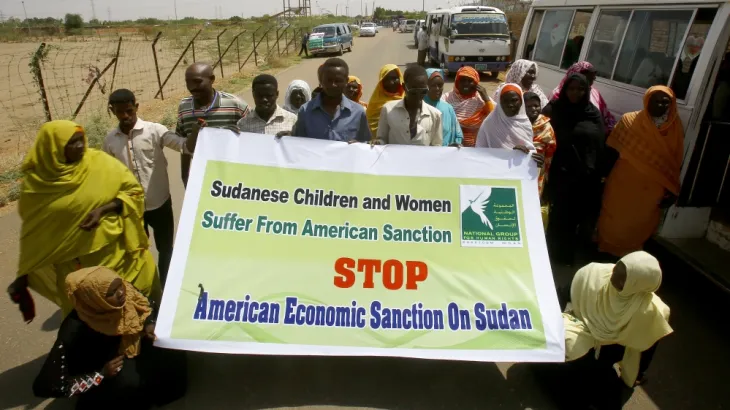Introduction Since 1983, Sudan has endured various forms of international sanctions, reaching their peak during the 1990s, and extending well into the 21st century. Although some sanctions were lifted or eased in the late 2010s, their prolonged impact continues to cast a long shadow over Sudan’s economic development, social progress, and institutional infrastructure, particularly in the health and education sectors.
Historical Context and Evolution of Sanctions (1983–2025) The onset of the Second Sudanese Civil War in 1983 marked the beginning of a prolonged period of instability and repression. From the 2000s onward, additional sanctions were imposed in response to various political and humanitarian developments. Sanctions on banking, trade, aviation, and arms were particularly detrimental, affecting every sector of life.

Economic Devastation and Underdevelopment Sanctions crippled Sudan’s economic infrastructure by cutting off access to international financial systems, deterring foreign direct investment, and barring the import of essential goods and technologies. The Central Bank of Sudan faced immense restrictions, resulting in a crippled financial system, rampant inflation, and a flourishing black market. Infrastructure projects stalled, agriculture declined, and industrial productivity plummeted. The cumulative result has been persistent poverty, soaring unemployment, and a widening wealth gap.
Barriers to Financial Transactions for Individuals Sanctions did not only target institutions—they severely impacted individual Sudanese as well. Everyday financial transactions became extremely difficult. Sudanese citizens were often unable to send or receive money internationally, even for essential needs. Families struggled to pay tuition fees abroad or send remittances to loved ones. One of the most tragic consequences of these restrictions was the inability to fund medical treatment abroad. Patients requiring life-saving operations or specialized care faced not only the challenge of obtaining visas and transportation but also the near impossibility of transferring funds to pay for services due to banking bans and correspondent banking cutoffs. These barriers caused avoidable deaths and further isolated the Sudanese people from the global healthcare system.
Health Sector in Crisis One of the most direct and devastating impacts of the sanctions has been on the health sector. Restrictions on medical equipment, pharmaceuticals, and international financial transactions paralyzed the healthcare system. Hospitals and clinics faced severe shortages of basic supplies such as syringes, antibiotics, and anesthesia. Modern diagnostic tools and life-saving equipment were often unavailable due to restrictions on imports and lack of hard currency.
The sanctions also stifled international collaborations in medical research and limited Sudanese access to global health networks. Epidemics such as malaria, cholera, and now COVID-19 were made worse by a crumbling health infrastructure, inadequate preparedness, and minimal foreign aid. The brain drain of medical professionals—seeking better opportunities abroad—further weakened the sector. Cancer patients, children with congenital diseases, and those requiring organ transplants often found themselves trapped in a broken system, facing certain death without access to international help.
Collapse of the Education System Sanctions severely hindered Sudan’s education system. Access to updated textbooks, scientific journals, laboratory equipment, and digital resources was nearly impossible. Universities struggled to maintain international partnerships, and students were frequently barred from participating in global academic exchanges or accessing online educational platforms due to IP restrictions.
Chronic underfunding, exacerbated by a bankrupt economy, led to the deterioration of school infrastructure, low teacher salaries, and a high dropout rate, especially among girls. Rural areas were particularly neglected, with many children growing up without access to primary or secondary education. Countless dreams were cut short, and an entire generation has grown up with diminished hopes for the future.
Humanitarian Toll on the People The Sudanese people have borne the brunt of the sanctions. Over four decades, millions have been displaced due to war and economic hardship. Sanctions turned everyday life into a daily struggle. Malnutrition became rampant in rural and urban slums alike, as food prices skyrocketed and essential commodities became scarce. Children went to school hungry—or stopped going altogether. Parents were forced to make impossible choices: whether to buy medicine or food, to emigrate illegally in search of a better life or remain and endure suffering.
Mental health issues surged due to the stress of economic instability, family separation, and societal collapse. Many families were split by emigration as skilled workers and youth fled the country in search of a better future, leaving behind aging parents and dependent relatives.
Civil society organizations, often lifelines for marginalized communities, struggled under restrictions that made it nearly impossible to secure funding or coordinate with international NGOs. The humanitarian fabric of the country unraveled, and the dignity of the people eroded under the constant weight of economic exclusion and international isolation.
Conclusion From 1983 to 2025, international sanctions have contributed to the systematic erosion of Sudan’s economic potential and human development. While they were intended to pressure the government into policy changes, the unintended consequence has been the widespread suffering of ordinary Sudanese citizens. As Sudan looks toward the future amid ongoing conflict and efforts at democratic transition, the removal of sanctions must be accompanied by significant investment in rebuilding the country’s shattered systems—especially in health and education. Only then can Sudan begin to recover from decades of isolation and underdevelopment


